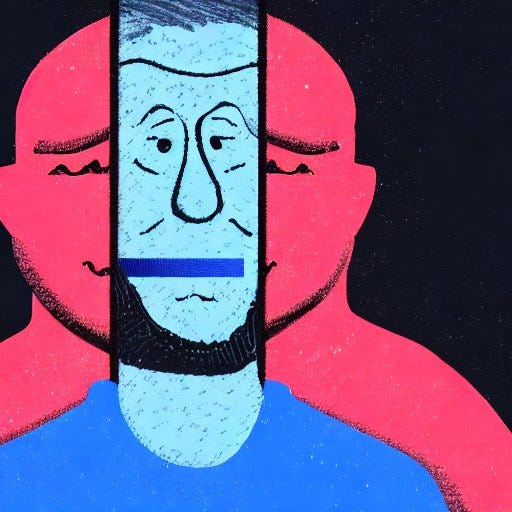Surprising Validators: Three Arguments You’d Usually Hear the Other Side Make – BCB #61
We’re more inclined to listen to opposing arguments when someone on our side says them. Such people have been called surprising validators, and the effect holds in many different contexts including business, public health, and political endorsements.
Without our defenses up, we might be more willing to engage in meaningful dialogue and introspection, which can be powerful tools for better conflict. Challenging our own tribe also requires courage – in the worst case, it might mean social or professional suicide. In this contrarian issue, we have three examples where criticism comes from an unexpected place, defying black-and-white thinking.
Slavoj Žižek calls for law and order
Leftist cultural theorist Slavoj Žižek argues that mass protests and riots neglect the safety of “ordinary” people, pushing them towards Red ideologies. His solution: Blue needs to embrace law and order. While Žižek understands why people across Europe, Russia, and the U.S. have resorted to violence, he thinks it is
unlikely to end with any kind of progressive settlement. … Everyday insecurity hurts the poor much more than the rich who live calmly in their gated communities.
For instance, following the fatal shooting of a 17-year-old boy named Nahel by French police in late June, protests erupted and destroyed transportation infrastructure supporting common people's livelihoods, ultimately affecting the poor more than the rich.
According to Žižek, embracing law and order can halt the further polarization of society.
Progressive forces must try and seize state power and use it, not only to calm people’s fears in times of emergency, but also to fight those fears – racist, xenophobic, sexist, antiprogressive – artificially concocted to keep populations in check.
There’s statistical evidence to support the idea that disorder is bad for progressives. In 2020, political scientist Omar Wasow published a careful analysis showing that the riots after Martin Luther King Jr.’s assassination probably gave the 1968 election to Nixon; but this is not something Blue wanted to discuss, and Democratic pollster David Shor was fired for Tweeting this paper during the height of the Black Lives Matter protests.
Breitbart exposes a racist’s text messages
Breitbart News published private telegram messages from Pedro Gonzalez, a Red influencer and avid supporter of DeSantis's 2024 presidential campaign, showing Gonzalez’s white supremacy and extreme view of Jewish and Black people.
The text messages included things like "I am at the point where I can respect Jews as individuals and like them as individuals, but as a group, I see them as problematic" and “Minorities like me see America for what it is—a country built by whites, that can only survive if whites survive.” Breitbart published an awful lot of this stuff, spanning several years.
Readers weren’t pleased, calling it a “hit piece” on Twitter, with sentiments like “Breitbart is going in the same direction as the National Review and Fox News” and “Throwing our fellow conservative under the bus with privately leaked text messages is shameful.”
Yet there are plenty of examples of conservative leaders openly denouncing white supremacy; it’s something that some in Red politics still need to hear, and perhaps hearing it from Breitbart will be more effective than hearing it from ProPublica.
Confessions of a transman feeling unsafe around women
“I don’t feel safe around cis women,” writes Devon Price, a transgender man and social psychologist. Price explains that women end up body-shaming, objectifying, and making sexist comments towards him in social and workplace settings, while he’s had no problems with men.
Female coworkers … are far more likely to ask invasive questions about a trans man’s genitals, chest, and any surgeries he might be pursuing, and to make comments that invalidate or police his identity.
By contrast, Price has found heterosexual men to be more at ease with his transition—“they genuinely see me as one of them.” It's women, and sometimes gay men, who seem tense. He explains this in terms of power:
It all comes down to power: who has it, who craves it, and who feels insecure about their relationship to it and chooses to lash out. … I believe many women and some gay men feel a need to put him in his place using the very same sexual and gender-based harassment they have regularly endured.
For example, Price explains that women make a lot of comments about his body, including:
how it moves, how it’s shaped, how I cover it or choose to cover it, how much they want a body like mine for their own, how much they want to touch it, how profoundly I am wrecking its feminine potential with my gender transition, and how paradoxically sexy the “damage” I’ve done has made me.
Quote of the Week
Violence actually has very little to do with the identity a person holds, and everything to do with their power.



